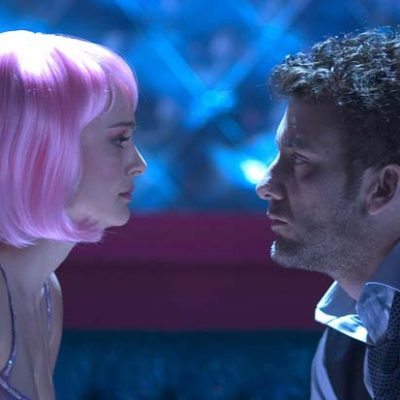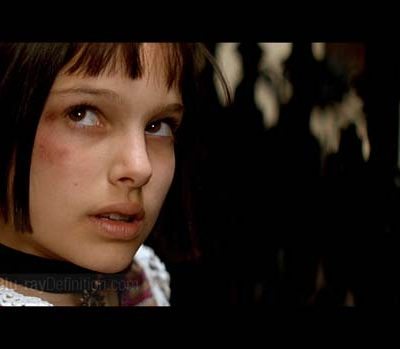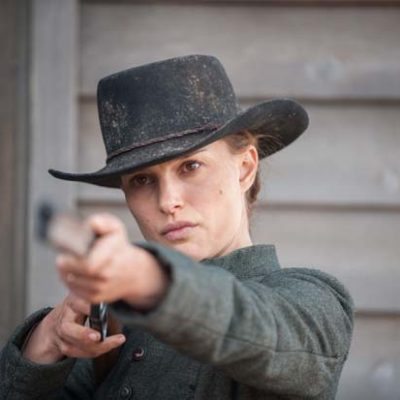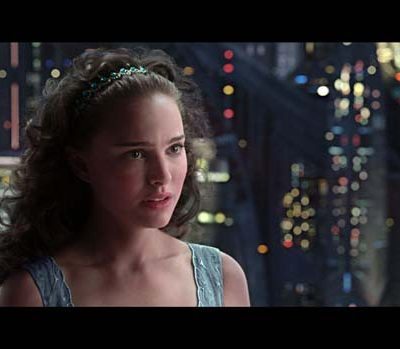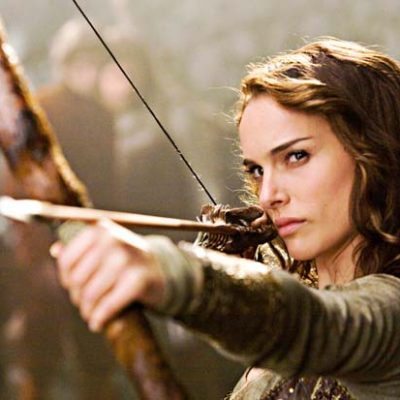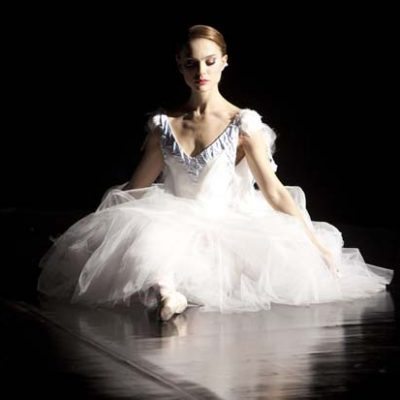
THE ISRAELI-BORN OSCAR WINNER, IN DISCUSSING HER JANUARY-RELEASE ACTION FILM JANE GOT A GUN, DESCRIBES NEWFOUND STRENGTHS, AND HOW THE WILD WEST OFFERED A SURPRISING SHOT IN THE ARM FOR WOMEN’S RIGHTS
BY SUSAN HORNIK AND MATT SCANLON
Young actor debuts in which pseudo or overt sexualization plays an important part are nothing new to moviemaking. From Sue Lyons’s role as the young siren Lolita in the 1962 Stanley Kubrick film of the same name, to Brooke Shields’s shocking first appearance as a teenage prostitute in 1978’s Pretty Baby, to Larry Clark’s still-controversial 1990 film Kids, in which audiences were introduced to Chloe Sevigne in a way that still tortures the soul, there is clearly questionable but dependable box office appeal in exploring the landscape of sketchy age morality, with highly variable payoffs for the performers involved. (Lyons basically never found fertile acting ground again, while the other two actors are, of course, still part of today’s go-to cast list.)
When she was just 11 years old, Natalie Portman was selected from an audition pool of more than 2,000 girls to take the lead in what would become one of the most highly discussed and successful action films of the ’90s, the Luc Besson-directed Léon: The Professional. As 13-year-old Mat Hilda, who survives a drug-related hit on her family at the hands of a corrupt police lieutenant (Gary Old man) only to fall in love with her down-the-hallway neighbor (who happens to be a hit man), Portman was astonishing. Poised, witty, and capable of handling the occasionally sexually charged script in a way that conveyed its emotion genuinely but never played up its more prurient aspects—the 1994 film made her an instant star.
In the 41 feature roles since (that’s about two each year if you’re keeping score for the 34-year old), Portman has not been afraid of playing the fragile ingénue (2004’s Garden State and an Oscar-winning role in Darren Aronofsky’s 2010 Black Swan), the fallen woman (2004’s Closer), or the dramatic or comedic heroine (2005’s V for Vendetta and 2011’s Your Highness, respectively). It was a further tribute to her acting chops (born in part from her time at Long Island’s Sudan Center for the Creative and Performing Arts) that she was able to soldier through what is largely considered to be leaden dialog in her depiction of Queen Amidala in the three Star Wars films from 1999 to 2005. This was clearly a mind of substance, a fact Harvard apparently picked up on, as she graduated from the University in 2003 with a degree in psychology.
While Portman was a toddler, her parents left her native Israel for the States, initially residing in Washington D.C., followed by a move to Long Island, where she attended Syosset High School. Discovered by a Revlon Cosmetics rep at a pizza parlor, who encouraged the 11-year-old to pursue a modeling career, she instead expressed interest in acting, And the rest, if our audience will forgive some hackneyed phrasing… is history.
Though she is typically quieter than her fellow A- listers (and famously mum about her personal life), Portman was outspoken while being interviewed onstage at the Toronto Film Festival while promoting her directorial debut, A Tale of Love and Darkness (a dramatization of the autobiographical novel by Israeli author Amos Oz, chronicling his childhood in Jerusalem). It wasn’t long, however, before the subject turned to complicated role choices. Acknowledging the frequent stereotyping of young female characters—such as the one that launched her career—she said, “It’s a trope as old as cinema…to have a very young girl disarm a much older man, and it’s not something I think is a particularly good trend. I think it’s just screenwriters writing this fantasy of a young, nubile girl who’s also an intellectual equal.”
She added that she found the character construct of what she termed “manic pixie dream girl”—a role she played in Zach Braff’s Garden State—to be almost equally “troubling,” but defended her decision to accept the part.
“I never looked at it that way when I read the script,” she said. “It was a character who was wacky and interesting, but it’s a good thing to recognize now, and good that people are thinking about it.”
At the same event, she noted that working with bad directors had actually provided her with the moxie she needed to make her own directorial launch.
“I had some funny acting experiences after Black Swan…funny meaning not that great,” she laughed. “After working with someone who’s sub-par, it gave me confidence. ‘I might not be Darren [Aronofsky] or Mike [Nichols],’ I thought, ‘But I can be at least as good as that person.’”
In her latest acting turn, Jane Got a Gun, which is scheduled for a January 29 release, Portman plays Jane Hammond, who carved out a life on the rugged plains of the 1800s with her husband Ham (Noah Emmerich) and young daughter. When Ham stumbles home riddled with bullets after a fight with the thoroughly unpleasant John Bishop (Ewan McGregor) and his gang, she turns to Dan Frost (Joel Edgerton), an old flame, for help. Haunted by memories, Jane’s past meets present in a battle for survival.
As he wrote the script, Brian Duffield envisioned Portman as the lead all along.
“I liked the danger and the threat that Natalie’s size and demeanor allows the film to have,” he said, adding that he had little hesitation in sending a draft to Portman’s Handsome Charlie Films. She was quick in seeing the story’s potential, and optioned the project as her first producing venture.
“I was drawn by Brian’s use of the western genre to explore Jane’s growing awareness of her own power,” Portman said, “and ultimately using that power to protect her family.”
The producer and star was also drawn by the surprising liberties available to women living in frontier territories at the time.
“The West was uncharted territory, so there were many more opportunities for women to be free,” she noted. “Women could hold jobs, ranch, and go to school and vote for the first time. Those rights happened for women first in the West.”
As the first actor attached to the film, Portman also had ample time to explore Jane’s characterization. “I really loved seeing this woman come up against so much and really find her own strength,” she recalled, then explained that she found producing Jane Got A Gun to be a valuable experience to bring to the role.
“Jane’s process was also my process,” she explained. “It was a relevant parallel experience of learning how to stand my ground, face difficult times, and not crumble. In order to save her family, Jane has to stop running and start fighting. She decides to take control, and in doing so discovers aspects of herself that she had previously only sought in the men in her life.”
“This is not necessarily a story that ends well, but ultimately for Jane there is a real development,” explained Edgerton.
In describing her roles as both star and producer of Jane Got a Gun, Portman explained that, “[The character] Jane’s process was also my process. It was a relevant parallel experience of learning how to stand my ground, face difficult times, and not crumble. Jane has to stop running and start fighting. She decides to take control.”
“What she’s gone through has damaged her, but also gave her something to live for, and the realization that she doesn’t really need the support of other people to move forward.”
There was an international group of cast and filmmakers on hand—including Australians Edgerton and Director of Photography Mandy Walker, the Scottish McGregor, Brazilian actor Rodrigo Santoro, and Irish dialect coach Gerry Grinnell—all bringing new perspectives to the classic American Western.
“It’s always wonderful when people make art in unfamiliar surroundings,” said Portman. “Tolstoy’s theory is that art is about making things strange, and with an Australian and a Brazilian on board it’s already strange and so it’s immediately art. That’s why Sergio Leone made such great Westerns—he had that completely different, non-American vision of the West.”
Charity Work and new roles Outside of Hollywood, Portman recently became the first Ambassador of Hope for FINCA, an international village banking microfinance program providing loans and savings programs to the world’s poorest so they can create jobs, raise household incomes, and improve standards of living. In that role, she works both through advocacy and by visiting FINCA program sites in countries such as Guatemala, Ecuador and Uganda. She has also met with U.S. Congressional representatives to lobby for support of international microfinance funding.
As an Ambassador of Free The Children (FTC) —an international charity and youth empowerment movement founded in 1995 by human rights advocates Craig Kiel burger and Marc Kiel burger—Portman lends her time to an organization that removes barriers preventing youth from being active local and global citizens. FTC supports projects like Adopt a Village, which has provided more than 650 schools and schoolrooms to communities in Africa, Asia, and Latin America, and provides clean water, health care, and sanitation to one million people around the world.
Portman married French dancer and choreographer Benjamin Mille pied in 2012, and after selling her Manhattan apartment, moved to Paris last year. She has three more roles scheduled for 2016 release, including the fantasy thriller Planetarium and an as-yet unnamed musical drama directed by Terrence Malick and co-starring Ryan Gosling, Christian Bale, and Cate Blanchet among a large ensemble cast. Perhaps her most anticipated role, however, will be released in 2017; in Jackie, she will portray Jacqueline Kennedy in the days immediately following the assassination of President Kennedy in 1963. The inside line suggests that the performance has Oscar written all over it.
